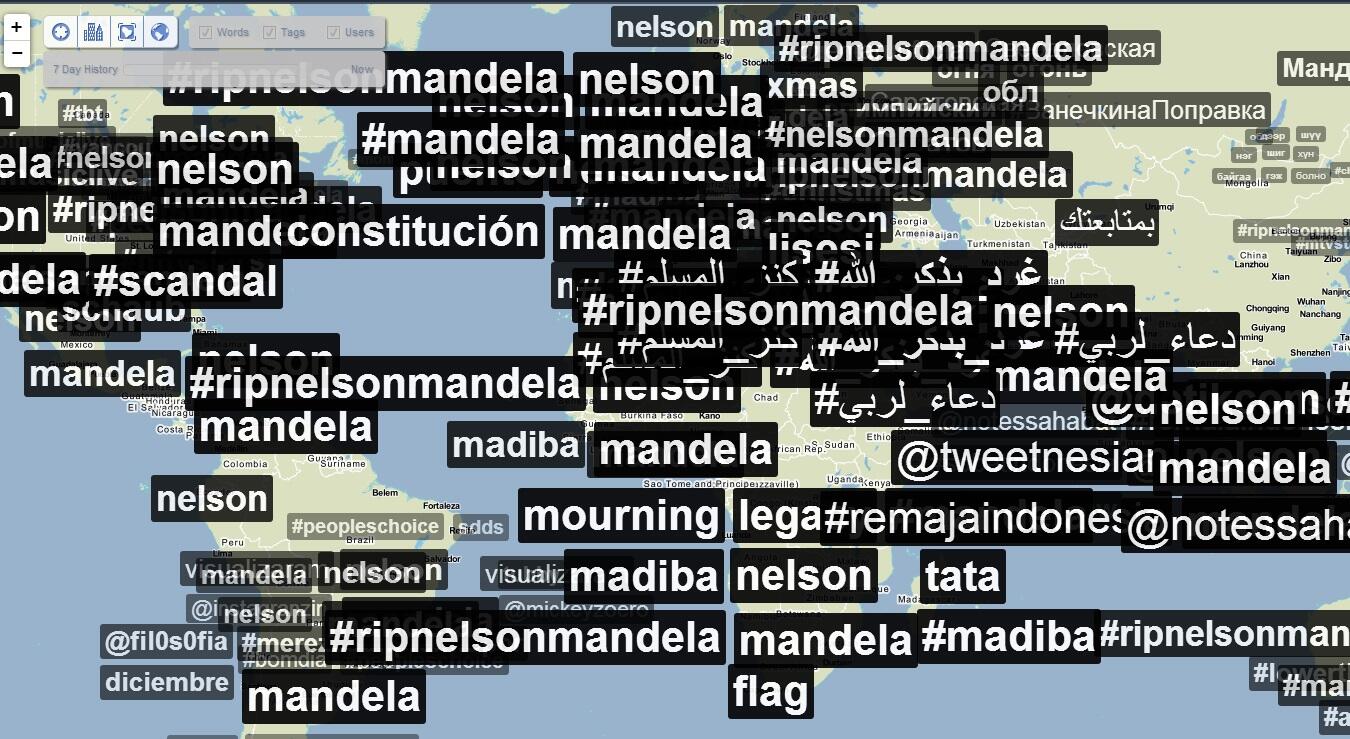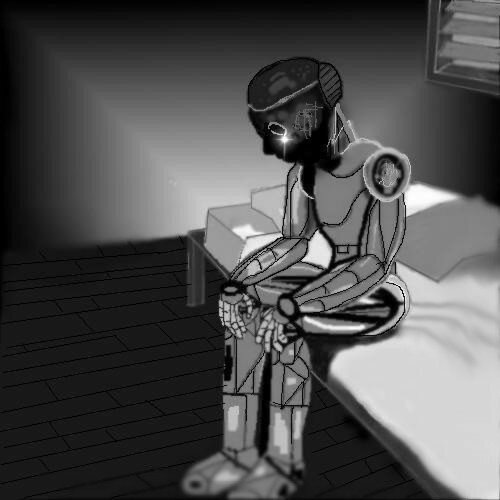“Give sorrow words; the grief that does not speak knits up the o-er wrought heart and bids it break.”
― William Shakespeare, MacbethVery recently Paul Walker and Nelson Mandela died. This caused a great number of people to mourn on social networking sites etc. this sparked a question in my mind: Why the hell are these people mourning about Paul Walker and Nelson Mandela as if they were closely genetically related.... ? My view of biological behavior i.e. the selfish gene theory was in a sense being challenged because I could not immediately explain this phenomenon in terms of this theory... so I had to think until i could explain the phenomenon or I would have to give up on my view. After a few minutes I worked out some reasonable explanations in terms of the theory and I will therefore share it with you. First as always, we define our key word and begin from the general case.
Why has it evolved?
Mourning is the expression of sorrow for another organisms death. It is an explicit behavior shown in many of our evolutionary ancestors and animals including ourselves. Here are some video examples of other animals showing symptoms of mourning or denial of the death of a close one:
Obviously different animals have different ways of expressing mourning based on their physiology and communication methods, but the capacity to experience emotional distress towards the death of a close relative etc. has strong evolutionary roots.
With all characteristics and behaviors of a living organism we ask the same question: what benefits are there to the organisms ability to further its genes to future generations? This is because any characteristic and behavior must have survived natural selection i.e. if it was a detriment to the organisms ability to pass on its genetic material over time such genetic material will gradually vanish from the gene pool.
When we observe mourning in any organism including ourselves there doesn't seem to be any direct benefit. When organisms mourn they expend energy (crying, making sounds, spending days carrying or looking after dead companions (like in the baboon video))... energy that could have been saved for finding food, mating or avoiding direct dangers which seem more important factors in an organisms ability to pass on genes. To an organism energy efficiency is everything. Also the death of a relative or companion would not directly impinge the ability of mating or general survival of the mourners. This is where thinking directly is plain wrong and quite naive, we must remember that nature is extremely meticulous and natural selection works in the crams and holes of life. So we must start thinking about indirect consequences. This is where the fun begins.
The mourning of a genetic relative actually makes sense because that relative shares your genes and because it has deceased it can no longer pass on its genes to the future. So the overall genetic material being passed down to the next generation has decreased. This is bad for the genes. For the genes to prevent this from happening they need to program the organism in which they inhabit to experience some sort of pain when seeing a deceased relative. As organisms are programmed to avoid pain and the causes thereof they will try and avoid the death of relatives, this will ensure that there is an increased chance of more of the same genetic material being passed down to the next generation. Obviously the genes don't just liberally program or think at will, natural selection (over a grand expanse of time) will select genes which tend towards instructing the organism to behave this way... as those that don't instruct this way or do the opposite will decrease the chances of genes being passed down the generations and therefore will die off.
There are also more possible benefits for example mourning for a close relative could be sexually advantageous. Two organisms who recognize one another or just one of them to be mourning may realize that if they mate with the mourner this could mean that the mourner will go an extra step further in protecting their young as they will want to avoid their deaths (through the emotional pain mechanism). Mourning could also be a reminder to the organism that death is bad. Really fucking bad. Death is akin to GAME OVER in biological terms as the organism is no longer surviving which means... no more reproduction (to pass on genes), no more looking after relatives (which pass on genes) and doing anything to pass on more genes which is the sole purpose of its existence. So anything to do with Death is greatly emotionally exaggerated. This could explain why mourning is so strong... as it is about avoiding the obliteration of genetic material.
However in more complex animals with slightly higher intelligence we witness the mourning of organisms of the same species but who are not close relatives at all. What benefits do these organisms have by mourning then? Well there are numerous possibilities. For instance in a group of animals, a loss could mean one less animal to protect the group from predators or one less to fetch food for the group. The strength of the mourning, I presume, will be proportional to the benefit the deceased had on the individuals survival and proliferation of genetic material chances. So the mourning of unrelated organisms who were of some benefit to the group and hence the individual will be less strong than mourning of relatives.
Another promising idea which could explain the mourning of unrelated organisms is that the mourning is simply a by product of the mechanism for mourning relatives. The organism will mourn anything that resembles a relative. By resemblance I do not necessarily mean physically but emotionally. If a bird raises a cuckoo egg which is not of its own, the cuckoo egg resembles a child of the host. When it hatches it will look nothing like the host but the host will emotionally associate the cuckoo as its own. When the cuckoo dies early the host will mourn as if it was it's own. In a pack of elephants it has been recorded that they mourn deaths of baby elephants even when not related to them, this means they have some emotional comprehension of the actual mothers grievance. In humans too, we build emotional attachments to friends which then go on to resemble relatives and when they die we mourn them as a consequence of such resemblance. This idea can be tested and observed in real life, it is possible to get animals to live with others completely unrelated but of the same species and then get another to live with only related and compare the extent of mourning between the two cases. Here is an elephant who mourned a dog (notice they say 'maternal instinct' i.e. the dog emotionally, not physically, resembled a baby elephant):
And a very astute ape mourns a kitten:
What are the selfish incentives for mourning on the internet?
-The death of Mandela is a top trend on twitter and many facebook users are showing their sorrow. -Picture BBC
So we have walked through some basic reasons as to why mourning could be advantageous to a living organism. With the global rise of social networking, the cyber-society where people house the details of their lives on websites, an influx of rich human behavioral phenomena comes our way to investigate. Many sites show streams of 'RIP' and 'Will be missed so much' messages about recent ( and normally instantaneously known) celebrity deaths. Why is this happening? I mean this not in a sinister to way but purely in a scientific way... what biological power is forcing huge amounts of people to mourn on social networking sites about people who are well known but have no personal ties to them? Could there be some, if any, hidden selfish reasons for people to mourn on social networks?
One obvious reason is that they are mourning because the said dead celebrity or person has bought them wisdom, happiness, laughter, technology, books, knowledge, music etc. which has changed their lives in a positive way. They are mourning because now that the said celebrity is dead, they will no longer be able to produce potential happiness for the individual. Here are some examples to help validate my reasoning:
These are just two examples in which the work, talent or gift which made the celebrity famous are highlighted in the mourning instead of their personal attributes. This is because people have engaged with these celebrities through what made them famous, Jackson's music may have touched the hearts of millions and Steve jobs innovations have changed how people interact with technology. You will witness this nearly everywhere, which makes sense as those mourning them will now have to cope without the benefits they received from these well known people.
One could argue that people mourn on social networking sites solely to conform. They may not even know who the deceased is and what they have contributed to society but they copy their fellow networkers in mourning. On twitter I have seen people who have openly admitted to not knowing too much about whoever that has died but then write how much they will miss them. These people will gain some social acknowledgement... through likes or followers.. and that is a selfish incentive to 'mourn'... they become more known in the cyber-society in which popularity is a measure of success.
Another plausible reason (in conjunction or instead of the others) is that we humans like to aid each other in mourning. We may feel sorrow for the death of a great human and just like if our relative died our friends and family comfort us social networks could also be the place to comfort and reassure one another. On my facebook and maybe on yours too, people mourn over their own relatives on facebook! I think this to get people to comfort them... and there is no reason why they shouldn't. One must not forget this is a selfish incentive. Mourning is not altruistic because obviously you cannot give anything to the dead for some future repayment or other benefits, so that is why I was looking for possible selfish reasons.
Still though... it is interesting to see how our strong biological roots and fears still force themselves through the most modern technology.
One obvious reason is that they are mourning because the said dead celebrity or person has bought them wisdom, happiness, laughter, technology, books, knowledge, music etc. which has changed their lives in a positive way. They are mourning because now that the said celebrity is dead, they will no longer be able to produce potential happiness for the individual. Here are some examples to help validate my reasoning:
One could argue that people mourn on social networking sites solely to conform. They may not even know who the deceased is and what they have contributed to society but they copy their fellow networkers in mourning. On twitter I have seen people who have openly admitted to not knowing too much about whoever that has died but then write how much they will miss them. These people will gain some social acknowledgement... through likes or followers.. and that is a selfish incentive to 'mourn'... they become more known in the cyber-society in which popularity is a measure of success.
Another plausible reason (in conjunction or instead of the others) is that we humans like to aid each other in mourning. We may feel sorrow for the death of a great human and just like if our relative died our friends and family comfort us social networks could also be the place to comfort and reassure one another. On my facebook and maybe on yours too, people mourn over their own relatives on facebook! I think this to get people to comfort them... and there is no reason why they shouldn't. One must not forget this is a selfish incentive. Mourning is not altruistic because obviously you cannot give anything to the dead for some future repayment or other benefits, so that is why I was looking for possible selfish reasons.
Still though... it is interesting to see how our strong biological roots and fears still force themselves through the most modern technology.
This opens another question which I will leave with you to ponder... can machines mourn with us?
An Aside
I was walking to the gym in Swansea late one evening and I was listening to one of my favorite audiobooks 'Genius: The life and times of Richard Feynman by James Gleick'. Something was different that evening because it was the last chapter of the book and I had gotten to know Feynman (in other audiobooks etc.) quite well. The chapter was winding up towards his death and i was beginning to feel quite emotional. The way Gleick told the story of Feynman was simply beautiful and hearing the last words of the book which described the last dying moments of Feynman actually made me cry. I have to be honest here I rarely cry. I do not know why I did. But I was mourning his death even though he died in 1988. He as character and scientist shaped my own thinking quite a bit and he was a complete honest, eccentric and great scientist that I just felt sad that he could not still be alive doing his crazy life stories and wonderful physics right now. I walked into an alleyway until i could regroup myself and tried to lift serious amounts of weights to combat my irrational moment of emotion.








No comments:
Post a Comment